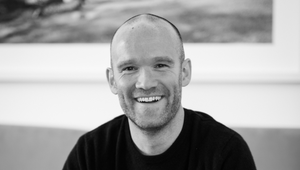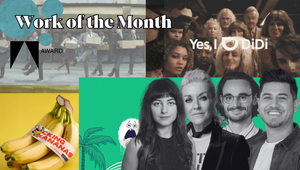
Colenso and Spark Overcame Hackers and Built a Giant Digital Snake to Transform NZ’s Gaming Scene

In a leap for New Zealand’s gaming culture, telco Spark’s inaugural gaming festival, Spark Game Arena Live, hoped to redefine the landscape with an immersive experience that featured Killabyte, an interactive boss fight.
This approach not only aimed to captivate gamers but also showcased the potential of live events to blend entertainment and interaction in groundbreaking ways.
Ally Young, brand partner at Spark, and Kim Ragan, group creative director at Colenso BBDO, told LBB’s Tom Loudon about the festival’s impact.
They discussed the inspiration behind transforming a traditional festival into a collaborative gaming adventure, the creative journey of designing Byte, the colossal digital snake, and the technical challenges of seamlessly integrating these immersive elements across the venue.
Their conversation highlights how the event represents a new frontier for gaming in New Zealand, setting the stage for future innovations in the industry.
LBB> What inspired Spark to launch New Zealand's first dedicated gaming festival, and how did you decide to turn the event into a co-op game?
Ally> In New Zealand, 79% of the population games. And as NZ is at the bottom of the world, we generally don’t get as many high-quality events coming to NZ as other countries get. That means we are often left off the line-up and don’t get world-stage gaming events like Dreamhack.
We realised that NZ gamers were missing out, and feedback proved they felt like they were, too. Spark provides a network for gamers to play on, and ‘Spark Game Arena’ is a brand platform to help ‘elevate the game’ for New Zealanders. Our ultimate gaming event, ‘Spark Game Arena Live’, was another experience for NZers - quite a lot of them - to interact with us and feel like they were part of the global gaming community. We aimed to bring the best of the gaming world to New Zealand.
Turning the festival into a game was discussed very early on – the idea of someone being able to walk in and choose the ‘game’ entrance or ‘general’ entrance and be a part of a game from their first step. Then, alongside Colenso BBDO, BUCK, Spur, Franklin Rd, and Satellite Media, the idea was developed into Killabyte. A full-scale interactive experience throughout the whole festival, not just the entrance. It was a lot of fun gamifying a gaming festival.
LBB> How do you envision the festival evolving in future years, and will there be further integration of immersive gaming elements?
Ally> Yes, we certainly hope so! Off the success of our first event, we are about to start building out what future years could look like. It will continue to be full of interactive experiences as that’s what gamers expect, which, in turn, creates authenticity and brand credibility for us. Now that we have completed the first event, we can only craft even better experiences for next time. We had 20,000 Killabyte interactions throughout the day so we have a good baseline.
LBB> How did you develop the idea of ‘Killabyte’ and design Byte as a giant digital snake? What were some of the creative challenges you faced?
Kim> Once we landed on the idea of staging a giant experiential boss fight, one of the critical considerations for character development was how we strengthen relevance through our character to Spark’s brand, as a telco and digital services provider.
The biggest challenge we faced was the festival environment itself. Killabyte had to grab attention but let people focus on other parts of the festival, such as tournaments, without getting in the way of those experiences. There was also health and safety to consider at the key ‘final death’ moment, where we needed to have excitement but not pandemonium. As a result, Killabyte is a very carefully choreographed experience without feeling that way while you’re in the throes of it.
LBB> Were there any surprises during the event, such as unexpected player behaviours or technical challenges?
Ally> Yes! We had someone try to DDoX (hack) our live Fortnite esports tournament nine times over three hours and take it down. Unfortunately, this behaviour happens in the gaming world, so we were prepared for such attempts, and our security and networks teams rebuffed them. Our prize pool was worth over NZD$250,000, so we got the gaming community talking.
Kim> Regarding Killabyte specifically, the game was designed for us to adapt to player behaviour. For example, if we needed more engagement, we could announce double points to get people swiping more to deal more damage. But on the actual day, things ran smoothly, and engagement exceeded expectations. The only real issue was the side quest, where players attempted to steal Byte’s scales to guarantee their win. But that’s so ‘gamer’ for you – always looking for a loophole within gameplay!
LBB> How do you think this festival will impact the visibility and growth of the New Zealand gaming industry, both locally and globally?
Ally> We have some incredible gaming brands in NZ. From Let’s Play Live (e-sports) to the New Zealand Game Developers Association (they support the lucrative PikPok studio).
We tried to involve as many NZ gaming brands as possible so we could showcase their hard work to not only NZ but also to those looking at our event from overseas. The international feedback post-event has been so supportive and encouraging. We were noticed.
LBB> How did the side quests and hidden Byte scales add to the festival’s appeal, and what kind of player participation did you see in these extra layers of gameplay?
Kim> Every great game has a side quest, and Killabyte is no different. Byte dropped his digital scales around the arena for players to collect, where they uncovered Byte’s lore and received messages straight from the snake’s mouth so-to-speak.
The overall engagement for the side quest was much higher than we expected, which I think speaks to gaming culture and a gamer’s dedication to playing every facet of a game they’re interested in.
In terms of numbers, there were 32 scales to collect, and we recorded almost 20,000 scans of these. The average time players spent on the mobisite taking part in the side quest was 13 minutes, but the most engaged players spent around an hour – this is a massive amount of time engaging with anything, let alone a branded mobisite. Our winners of the day exceeded an hour of engagement.















